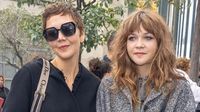Ramona Sarsgaard, the daughter of actress Maggie Gyllenhaal and actor Peter Sarsgaard, was arrested during an anti-Israel protest at Columbia University's campus on Wednesday, May 7, 2025, police sources confirmed to the New York Post. Sarsgaard, 18, a student at Columbia College, received a desk appearance ticket for criminal trespassing in relation to the incident.
She was among nearly 80 people arrested for storming Butler Library as students prepared for their final exams. At least two school safety officers were reported to have suffered injuries during the response to the melee, according to officials. At least 65 interim suspensions were handed down to Columbia University students who participated in the protest, and an investigation is pending, a school official confirmed. However, it's unclear whether Sarsgaard was among the students suspended as of Friday, May 9, 2025.
Video obtained by the New York Post showed protestors detained in zip ties led out by New York City Police Department officers and onto nearby police buses following the incident, which started after demonstrators shoved past security to barge through the library's front entrance. The protestors draped large signs over bookshelves stating, "Columbia Will Burn" on glass cases and marked tables with colored tape. An additional 33 other people from affiliated institutions and an unspecified number of alumni were also banned from the campus for their roles in the incident.
Ramona Sarsgaard's involvement in the protest aligns with a broader movement among students at Columbia University advocating for Palestinian rights amid the ongoing Israel-Palestine conflict. The protests have sparked intense debate and controversy, particularly in light of the current political climate surrounding the issue.
Secretary Marco Rubio has publicly condemned the protestors, labeling them "Pro-Hamas thugs" and vowing to review the visa status of all those involved. In a tweet, he stated, "We are reviewing the visa status of the trespassers and vandals who took over Columbia University’s library. Pro-Hamas thugs are no longer welcome in our great nation." This statement reflects a growing tension between government officials and activists advocating for Palestinian rights.
Interestingly, the protests have sparked a nuanced conversation about the perception of pro-Palestine activism in the United States. While some view the protests as a legitimate expression of solidarity with Palestinians, others, including Rubio, have framed them as support for terrorism, complicating public sentiment around the issue.
Maggie Gyllenhaal, Ramona's mother, has a history of political engagement but has been somewhat reticent about discussing the Israeli-Palestinian conflict specifically. In a 2014 interview with TIME magazine, she avoided addressing the issue directly, although her work, including the mini-series "The Honorable Woman," has been interpreted as reflecting the complexities of the conflict.
As the situation develops, Columbia University faces public pressure to take strong action against the protestors. The university's administration has already issued interim suspensions, and the investigation into the protests continues. It remains to be seen whether Sarsgaard will face further repercussions or if her family's prominence will shield her from significant fallout.
In the wake of the protests, the dialogue surrounding the Israel-Palestine conflict has intensified, with many advocating for a more compassionate understanding of the situation. The recent protests at Columbia University highlight the generational divide in attitudes towards activism and political expression, particularly among young people.
As public figures and celebrities increasingly engage in social justice movements, the implications of such actions resonate beyond the immediate context of the protests. The involvement of Ramona Sarsgaard in this protest serves as a reminder of the complex interplay between celebrity culture, activism, and political discourse.
While the immediate consequences of the protests are still unfolding, the broader implications for how society views activism, especially in relation to the Israel-Palestine conflict, are significant. The protests have become a flashpoint for discussions about freedom of expression, the role of government in regulating dissent, and the responsibilities of public figures.
As the narrative surrounding these protests continues to evolve, it raises important questions about the future of activism in America and how young people will shape the discourse on critical global issues.
In conclusion, the arrest of Ramona Sarsgaard during the Columbia University protests underscores the complexities of activism in today's political climate. As the university navigates the fallout from these events, the conversation surrounding the Israel-Palestine conflict and the role of young activists in shaping public opinion remains as crucial as ever.






